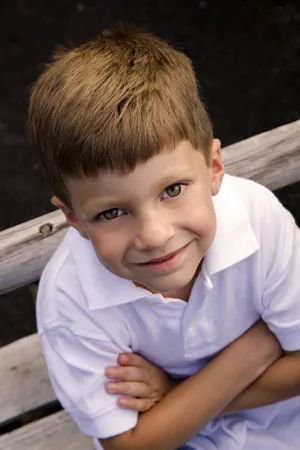Will They Be Ready

Kindergarten readiness takes center stage
by Julie Morris
Catching the bus pull away on the first day of school, many parents feel a range of emotions, not the least of which may be worry about what challenges the new school year will bring. For many parents, this sense of concern increases as more and more changes occur as a result of local and national educational reform efforts. Along with heightened expectations for students and teachers as schools strive to meet the complex accountability requirements of the national No Child Left Behind Act, significant changes to the public school system have taken place in recent years in Billings, including a rapid transition to a full-day kindergarten program and budget cuts that have increased class sizes. No doubt many parents are left wondering what all of these changes will mean for their children, especially parents whose kindergarten children will likely have a much different first year experience from that of previous generations.
As more children attend daycare and preschool, kindergarten functions less as the traditional, transitional experience between home and school. This, along with higher end-of-year expectations, tends to result in an increased focus on academic skills. As pressure mounts, many parents are asking, “Is my child really ready for kindergarten?”
Kindergarten readiness is generally described as an overall reflection of a child’s development, as measured by growth levels in areas that have been shown to have a positive impact on academic success. These areas typically include a child’s physical, emotional, social, and cognitive development. Oral language abilities, pre-reading skills, gross and fine motor skills, and the ability to follow directions and practice self-help skills are all aspects that fall into these categories.
Certain studies have suggested that significant numbers of children entering kindergarten classrooms in the United States are not adequately prepared for school. Two recent reports indicated that one in three children in Michigan and one in two children in Washington do not possess adequate skills in order to be successful in today’s kindergarten.
As a result, many states and districts have been working to develop formal definitions of school readiness along with assessment criteria to help identify and provide assistance to the children who need it. Governor Brian Schweitzer’s promotion of school readiness has drawn attention to the critical importance of learning in the early years and has encouraged communities around Montana to develop ways to improve early learning opportunities for young children.
In Billings, United Way of Yellowstone County (UWYC) has taken an active role in promoting kindergarten readiness, due in part to a local presentation in which Rob Grunewald (Federal Reserve Bank of Minneapolis) shared research demonstrating how an investment in certain types of early childhood programs can reduce spending in the areas of education, welfare, and the criminal justice system, with returns on investment as high as $17 for every dollar spent. These powerful results inspired Carol Burton, UWYC’s President and CEO, enough to establish an Early Childhood Initiative. “At United Way of Yellowstone County, we are committed to making a difference in our community for families with young children,” she said. Burton believes in promoting positive change by raising awareness and building relationships with community stakeholders to address local issues related to early childhood development.
Educating parents about child development is one important component of promoting school readiness. As numerous research studies have shown, the years from birth to six are a critical period for young children’s brain growth and overall development. During this time, children need experiences which support that development and nurture their natural curiosities, like listening to stories and songs, experimenting with finger paints, spending time outdoors, and playing with open-ended toys like blocks and balls. However, parents wanting to provide the best opportunities for their children may not have sufficient access to quality information, and may not know the best ways to nurture their children’s development.
In response to this problem, UWYC began distributing “Getting Ready for Kindergarten” calendars throughout the community, in partnership with the Muryl and Lu Myhre Foundation, Inc. and most recently, the Dennis and Phyllis Washington Foundation. These calendars were designed as a tool for parents to know how to help their children develop the skills, knowledge, and behaviors that will bring success in kindergarten. Each month of the calendar focuses on a different theme, from learning letter sounds and counting to developing finger skills and preparing for the first day of school, and offers suggestions for simple, daily, hands-on activities. Also included is general information about school readiness guidelines, local schools, and suggested reading lists. Calendars are distributed free of charge to families in Yellowstone County with four and five year old pre-kindergarten children and can be obtained at the Children’s Services desk at Parmly Billings Library or by calling the local United Way office (252-3839).
Communities benefit when children enter school prepared for the challenges ahead. Teachers spend more time teaching required lessons and less time on remediation, and children thrive because they feel more confident and possess the abilities to do the work. It is not surprising that some studies have found a link between low levels of kindergarten readiness and increased high school drop-out rates. A continued focus in our community on developing parent education materials and opportunities to promote children’s pre-kindergarten development will go a long way in helping parents to put their kindergartners on the bus with confidence and perhaps fewer tissues in hand. SFM
Julie Morris is an educator with a passion for children's literature and promoting literacy. Her greatest joy is having two young sons who love to read.
